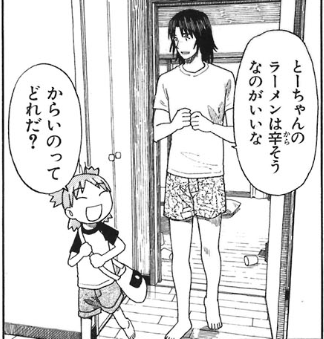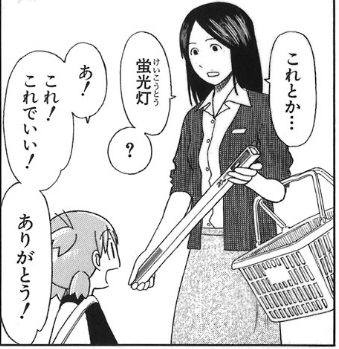They are both close enough to make no difference as far as I can see! Thank you so much (again!) Kazzeon!
![]() Unfortunately, this doubt will follow me to my grave.
Unfortunately, this doubt will follow me to my grave.
Page 121
こんなあったら じゅうにいっかい たべても…
こんな - such
あったら - is this ある in た-form + ら to make the conditional… “if there is”?
じゅうにいっかい - no idea! “12 one time”???!
たべて - to eat, in て-form
も - also / even
Yotsuba then goes on to talk about calculating if you eat every day, but it still doesn’t help me work out this sentence.
Sorry to be a pain.
I understood it as, “If I had this many, even if I ate 12 at once…”
…まいにちたべられるけいさん
“…(the calculation is that) I could eat (it) every day.”‘’
![]() Marcus, what did we say? No apologizing!
Marcus, what did we say? No apologizing! ![]()
![]()
Yeah. Who said you were a pain? I’ma beat them up.
I’m sure when I read this that this was an actual word in the dictionary. I’ma have a closer look when I get home.
Thank you both so much! It’s starting to make some sense now! Thank you!
The only reason I’m in pain is because you always post while I’m asleep. I don’t even have a chance to get Leebo’d ![]()
Ok, I’ve had a chance to check the issue here - it’s しゅう, not じゅう. Specifically it’s 週に一回 - once a week. “There’s so many here that even if I only ate one a week, I could eat them every day”.
That absolutely twisted logic explains the expression the lady is making.
I’m an idiot! ![]()
Thank you Belthazar!
![]()
You what m9 ![]()
I’m blind! ![]()
Ok, time to read this week’s chapter. ![]()
Gotta cut down on the distractions! xD
へぇ

Ok! I think my doubt was solved by this:

Yotsuba answers with からいのってどれだ? Which is/are the spicy one(s)?
I was like, wth her head. ![]()


![]()

![]() I remembered the 蛍光灯 joke in のんのんびより
I remembered the 蛍光灯 joke in のんのんびより ![]()
Is the store clerk just a huge baseball fan? ![]()
I know it’s Yotsuba and all, but I sometimes feel like, she didn’t even buy her dad anything. ![]()
![]() Even kids understand that sort of thing. I know it’s more that the lady caught her by surprise asking her what she liked least, but still. u_u poor とーちゃん
Even kids understand that sort of thing. I know it’s more that the lady caught her by surprise asking her what she liked least, but still. u_u poor とーちゃん ![]()
That was a good chapter, though, really relaxing until that point.
Doubt she’s a clerk at the kombini. More like she’s just shopping while on a lunch break from her own work.
Not clear on where baseball comes into it.
Aye, you touched on it too, but she kept getting distracted at critical moments. Noticing the candy aisle while she’s trying to remember the eraser, getting asked which item she dislikes when trying to decide which candy to put back, and so forth.
Wait, thats not the store clerk right? I thought it was a random customer.
I’m talking about the cashier. ![]() She says Home run and ぎりぎりアウト
She says Home run and ぎりぎりアウト
I also blame the cashier a little, she asked Yotsuba if she was on an errand, to which the answer was yes. If you see a kid’s buying food and candy, you don’t tell them, “just don’t buy the food.”
Oh, right. It’s just that you put that comment next to the picture of the customer holding the fluoro tube…
Aye, it probably should have been apparent to the cashier that the purpose of the trip was the ramen - especially considering when Yotsuba walked in she explicitly said “I’m here to buy ramen.”
A little late this time! (I was working and just remembered ![]() )
)
Discussion of Chapter 47 starts here.
Remember you can always ask questions about previous chapters.
Only 2 more weeks to go until we finish the volume! ![]()
Is it just me, or it seems pretty fast looking back on it? ![]()
Oh yeah. I’ve been sitting here all day trying to remember what it is that usually happens on Mondays. “Aria? No, that’s Saturdays. Hmm…”
At long last, Yotsuba finally gets to visit the ranch. Shame about Yanda. ![]()
Can someone explain Yanda’s goroawase on page 165? I don’t get it.
Yotsumoji of the week

I dunno why, but for some reason this is way funnier than the English version (in which she says “N. O.”, and Yanda replies “Why’d you spell it out?”). Perhaps it’s the incongruency of it.
Fairly sure this is the song Yotsuba’s singing on page 168, though I’m not sure the vowel elongation marks match the rhythm of the song. Took me an embarassingly long time to work out why the tune rang a bell - it’s an English song, is why.
![]()
That’s a classic.
A song in a lot of languages, Spanish too. (I think, but I can’t remember what it was)
I resorted to reading the English version, and…
I still don’t get it.
But I found some stuff online and…
I think it’s not supposed to make sense, sadly enough.
I even found a document (page 58) with notes from the English and German translator on that specific sentence.
You see, it's obvious
牧場へ行く途中に、なぜ突然牧場に行くことにしたのかの理由として〈やんだ〉が「牛の
日」を挙げる場面がある。(1-6d)では、単に③語の意味を翻訳しており、それに対する〈と
ーちゃん〉の反応も日本語版と同じく、「牛の日」という架空の記念日を否定するものにな
っている。
それに対して(1-6e)では、③語の意味の翻訳に加えて⑤文字テクスト中に情報を追加し
ている。“of summer”という追加された情報の根拠は注を読むと理解できるようになってお
り、「牛の日」を「丑の日」と読み替えたものであることが分かる。ただし、6 巻に 9 月を
迎えた描写がある113ことから、作中の時期と注による説明が食い違うことになってしまっ
ている。
これに対する〈とーちゃん〉の反応は、文字テクストの内容は日本語版と同じだが、意味
する内容は「今日は丑の日の時期ではない」ことを示すことになり、日本語版とは異なった
やりとりになる。日本語版やドイツ語版では、「牛の日」というもの自体が〈やんだ〉ので
たらめであるのに対し、英語版では〈やんだ〉が牧場の牛と「丑の日」を結びつけてこじつ
けている内容に変わっていることになる。
この場面のやりとりの変化は、「牛の日」という語を日本のイベントである「丑の日」と
翻訳者が結び付けて示したことによって起こったものである。やりとり自体には破綻がな
いため、単に文字テクストの内容変更の翻訳であるといえるが、もともとは「牛の日」は「丑
の日」とは関係がないと考えられるため、読者のミスリードを引き起こす可能性もあった。
But yeah, from what Google Translate could gather, in German and Japanese, Yanda is making stuff up, but in English they changed it so it had something to do with a day in Japan or something.
That was like 40 minutes of looking stuff up for this. ![]()
When I read it, I assumed he was spouting nonsense, and apparently that was a decent guess. I didn’t even know what a goroawase was.
The only thing I got out of it, that might make sense, has to do with the reading of 25日. Going off of the readings for 二十日 and 五日, you read 25 as はついつ. This is similar to the reading of 初市 (はついち), meaning the first market of the year. Plugging this in gives the day of the first market of the year, and therefore (with some imagination) the connection to cows. The obvious flaws are that I didn’t use 9月 at all, and that the readings aren’t exactly the same. Also, I’m not familiar with 初市 at all outside jisho, so i’m not even sure if it means what i think it means…
This is probably too far fetched, and it’s way more likely that he’s making stuff up, expecially after Kazzeon’s post. I just liked to entertain the thought (and post it, cause why not…) ![]()
There is something called 土用の丑の日 (doyou no ushi no hi), or “Midsommer Ox Day”, once or twice every year in the period before autumn. For more information, see here in English or Japanese wiki. In any case, this day is in July or August, so it’s obviously never on September 25. (There’s another 丑の日 during Winter – that can’t be it, either.) So yeah, Jumbo is obviously talking nonsense.
What puzzles me however, is the ・ between the 「う・し」 which seems to indicate it was in fact supposed to be a pun, but I’ve thought about it for a long time with all possible readings of the numbers and days and it just doesn’t make sense, so I’m not sure.
